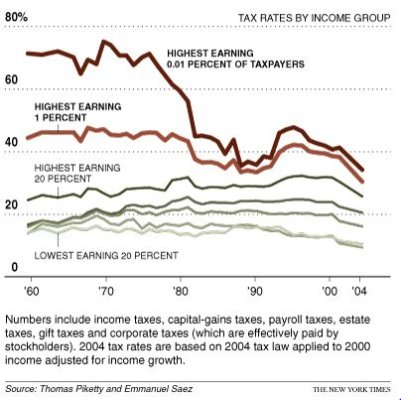Gone4Good
Give me a museum and I'll fill it. (Picasso) Give me a forum ...
- Joined
- Sep 9, 2005
- Messages
- 5,381
Of the many ridiculous hyperbolic claims that pass for truth these days the one expressed most frequently is that the U.S. is, or is becoming, a socialist state. The truth, though is that the U.S. is far less “socialist”, and government intervention in the private sector is far smaller, than it was at nearly any time in the past 80 years.
Here’s an article about how the 1996 Welfare Reform law is keeping the growth of welfare recipients below 10% notwithstanding a more than doubling of the unemployment rate.
Or consider . . .
- The median top marginal tax rate from 1920-2010 is 70% versus 35% today
- Union membership has declined from 36% of all workers in 1945 to 13% today
- Social Security was reformed in 1983 to be less generous
- Welfare reformed in 1996 to be less generous
- Many industries regulated in the 30’s have been deregulated – Rail & Truck transportation deregulated in 1971, natural gas deregulation in 1977, airline deregulation in 1978, interstate bus deregulation in 1982, ocean shipping deregulation in 1984, Telecommunications deregulation in 1996, and Glass-Steagall repeal 1999 . . . among others.
- Wage & price controls 1971-1973
Looked at objectively, it is very hard to say we're a more socialist country today than we were in say, 1950. But yet many people [-]are told[/-] assume we are.
Here’s an article about how the 1996 Welfare Reform law is keeping the growth of welfare recipients below 10% notwithstanding a more than doubling of the unemployment rate.
Or consider . . .
- The median top marginal tax rate from 1920-2010 is 70% versus 35% today
- Union membership has declined from 36% of all workers in 1945 to 13% today
- Social Security was reformed in 1983 to be less generous
- Welfare reformed in 1996 to be less generous
- Many industries regulated in the 30’s have been deregulated – Rail & Truck transportation deregulated in 1971, natural gas deregulation in 1977, airline deregulation in 1978, interstate bus deregulation in 1982, ocean shipping deregulation in 1984, Telecommunications deregulation in 1996, and Glass-Steagall repeal 1999 . . . among others.
- Wage & price controls 1971-1973
Looked at objectively, it is very hard to say we're a more socialist country today than we were in say, 1950. But yet many people [-]are told[/-] assume we are.

